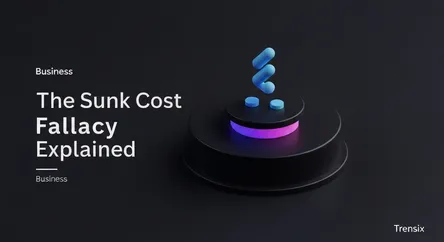Business
The Sunk Cost Fallacy Explained

Discover the Sunk Cost Fallacy, a bias that makes you stick with a bad decision because you've already invested time, money, or effort.
What is it?
The Sunk Cost Fallacy is a cognitive bias where individuals continue a behavior or endeavor as a result of previously invested resources, such as time, money, or effort. This occurs even when it's clear that abandoning the endeavor is the more rational choice. The past investment, or "sunk cost," is irrecoverable and therefore should not factor into future decisions. For example, continuing to watch a terrible movie simply because you paid for the ticket is a classic illustration of this fallacy; the money is gone regardless of whether you finish the film.
Why is it trending?
This concept is a cornerstone of behavioral economics, a field gaining mainstream attention for its insights into why people make seemingly irrational financial choices. As individuals and businesses navigate economic uncertainty, understanding biases like the sunk cost fallacy becomes crucial for better strategic planning and resource allocation. It's frequently discussed in contexts ranging from startup culture (knowing when to pivot) to personal finance (avoiding throwing good money after bad investments) and project management.
How does it affect people?
This fallacy significantly impacts both personal and professional lives. In business, it can lead to companies pouring millions into failing projects to avoid "wasting" the initial investment, ultimately resulting in greater losses. Personally, it can trap people in unfulfilling careers, relationships, or commitments because of the time and emotional energy they've already dedicated. Recognizing this bias allows individuals and organizations to make more logical, forward-looking decisions based on future potential rather than past expenditures, leading to better outcomes and less regret.